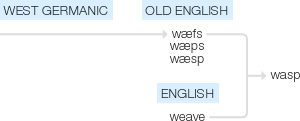Wasp
Old English wæfs, wæps, wæsp, of West Germanic origin, from an Indo-European root shared by Latin vespa ; perhaps related to weave1 (from the weblike form of its nest).
wiktionary
From Middle English wasp, waspe, waps, from Old English wæsp, wæps(“wasp”), from Proto-Germanic *wapsō, from Proto-Indo-European *wobʰseh₂(“wasp”), from *webʰ-(“weave”) (referring to the insect's woven nests). Compare Dutch wesp, German Wespe, Danish hveps. The metathesis of s and p reflects a process of some generality in Old English, cf. ascian ~ acsian(“to ask”); here, Latin vespa(“wasp”) (also a cognate- cf. Old French wespe) may have helped tilt the scales in favour of -sp.
Originally an acronym for White Anglo-Saxon Protestant.
etymonline
WASP (n.)
acronym for White Anglo-Saxon Protestant, by 1955.
wasp (n.)
Old English wæps, wæsp "wasp," altered (probably by influence of Latin vespa) from Proto-Germanic *wabis- (source also of Old Saxon waspa, Middle Dutch wespe, Dutch wesp, Old High German wafsa, German Wespe, Danish hveps), from PIE *wopsa-/*wospa- "wasp" (source also of Latin vespa, Lithuanian vapsa, Old Church Slavonic vosa "wasp," Old Irish foich "drone"), perhaps from root *(h)uebh- "weave" (see weave (v.)). If that is the correct derivation, the insect would be so called for the shape of its nest. Of persons with wasp-like tendencies, from c. 1500. Wasp-waist in reference to women's figures is recorded from 1870 (wasp-waisted is from 1775).
